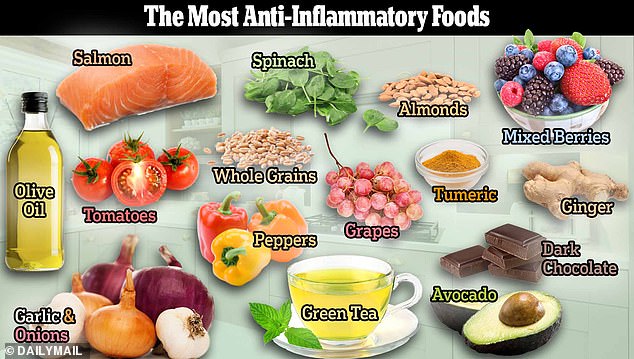The 15 joint-soothing foods that scientists now believe could treat long Covid
It has long been known that certain foods can relieve joint pain and help manage chronic diseases such as diabetes by reducing inflammation.
Now researchers are studying whether an anti-inflammatory diet with foods like berries and fatty fish could treat the symptoms of Long Covid, which are still largely misunderstood.
Doctors at the University of Southern California (USC) announced this week a first-of-its-kind clinical trial testing the effect of an anti-inflammatory diet on long Covid symptoms that experts believe affect more than 20 million Americans.
The team bases the study on recent research that suggests Long Covid could be caused by a hyperinflammatory response that occurs when the body fights the virus and doesn’t stop.
There is no proven treatment for the condition, which has led to widespread debate about the symptoms being exaggerated or attributed to other health problems.
Dr. Nuria Pastor-Soler, principal investigator and associate professor at the Keck School of Medicine of USC, said: “Research like ours is critical to advancing our understanding of long-COVID and ultimately helping to find effective treatments to improve the quality of life of patients.”
“The results of this study will hopefully bring us closer to possible solutions.”

Long Covid is a condition that includes a wide range of symptoms such as shortness of breath, brain fog, fatigue and depression that last for weeks or even years after recovery from the virus

USC researchers are conducting a first-of-its-kind clinical trial testing the effect of an anti-inflammatory diet on long Covid symptoms, which experts believe affects more than 20 million Americans
Researchers plan to enroll 50 long-term Covid patients who will be treated at USC’s Covid Recovery Clinic. Half of the participants will be given a 30-day anti-inflammatory diet plan, while the rest will stick to their regular diet.
At the end of the month, the team will measure each patient’s inflammatory markers and Long Covid symptoms. If patients tolerate the dietary intervention and show symptom relief, researchers will expand the study to a larger population.
Dr. Adupa Rao, researcher and medical director of the Keck Medicine Covid Recovery Clinic, said: “We are studying whether food choices can calm the body’s inflammatory response, effectively minimizing or containing the symptoms of long-term Covid.”
This study will be the first to examine the effect of certain foods on Long Covid symptoms.
Long Covid is a condition that includes a variety of symptoms such as shortness of breath, brain fog, fatigue and depression that last for weeks or even years after recovery from the virus.
There are still serious debates about the true extent and severity of the disease. Several studies indicate that people who develop this condition, whether they have Covid or not, have suffered from these common symptoms.
The extent of long Covid patients is unclear, but the Centers for Disease Control and Prevention estimates that one in 13 adults in the US, or 7.5 percent, have long Covid, defined as symptoms lasting three or more months after the first infection with the virus.
In some cases the disease can be fatal. The CDC reported late last year that more than 3,500 Americans died from an illness long linked to Covid in the first two and a half years of the pandemic. Most documented deaths occurred in older adults, with those aged 75 to 84 accounting for nearly 30 percent of deaths.
Research published in the journal in August Natural medicine claimed that long-Covid was more disabling than cancer, although doctors told DailyMail.com these claims were “irresponsible”.
In February, researchers at the Harvard TH Chan School of Public Health collected data from more than 32,000 nurses and found that nurses who practiced healthy lifestyle habits such as getting enough sleep and eating healthy were half as likely to develop long Covid.
The benefits of anti-inflammatory foods are much better understood. Oily fish, for example, is one of the most anti-inflammatory foods due to its high content of omega-3 fatty acids. These are polyunsaturated or “healthy” fats that support the function of cells in the brain, heart and endocrine system.
The omega-3 fatty acids found in these fish are eicosapentaenoic acid (EPA) and docosahexaenoic acid (DHA). These have been shown to lower levels of fats called triglycerides in some patients, which could lower blood pressure. They have also been shown to support immune function and proper fetal development.
A 2021 study published in the journal molecules found that a diet containing fatty fish reduced inflammation in adults at high risk of diabetes and heart disease, which the experts said could help prevent both diseases.
EPA and DHA are mainly found in salmon, herring, sardines, mackerel, trout and anchovies.
Fruits such as berries, tomatoes and grapes also have anti-inflammatory effects. Berries are packed with antioxidants called anthocyanins, which have been shown to reduce inflammation and reduce the risk of heart disease. A look back at 2018 Journal of Berry Research also suggested that berries may reduce the likelihood of developing cancer.
Spices and aromatics such as turmeric, ginger, garlic and onions also reduce inflammation. Turmeric, in particular, is packed with curcumin, a compound that has been shown to relieve pain in arthritis and reduce inflammation in diabetes.
